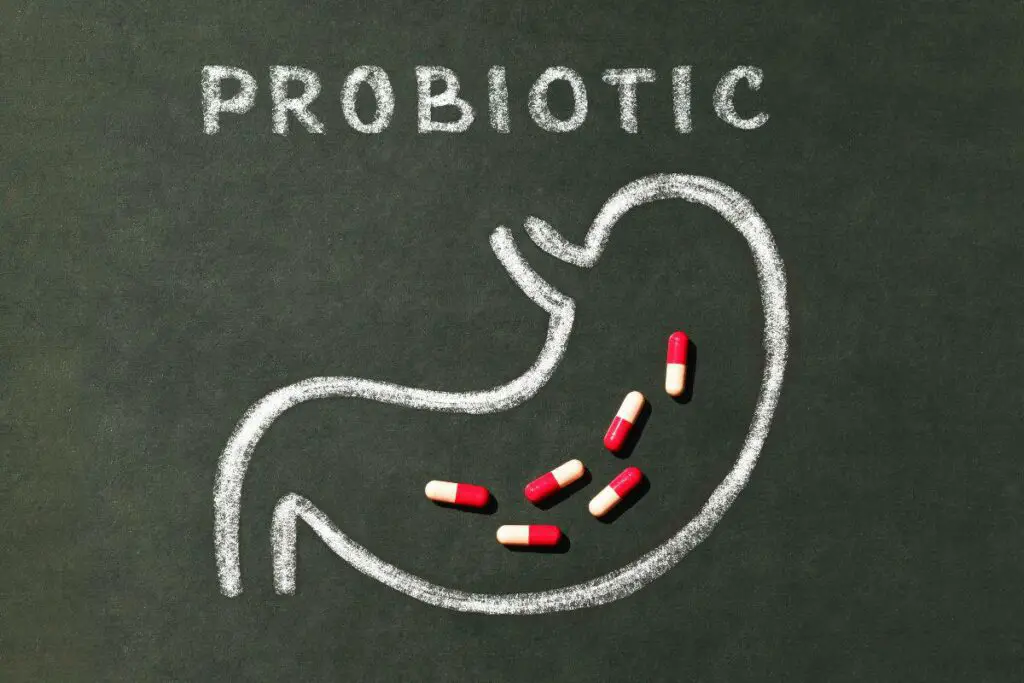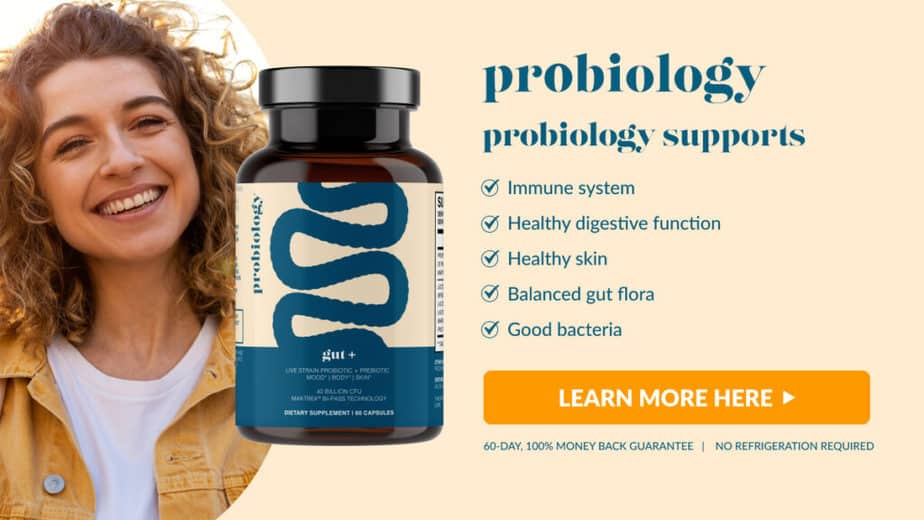Are you torn between the convenience of a tablet and the quick absorption of a liquid when it comes to choosing your probiotics? Today, we’re diving into the ultimate guide on liquid or tablet probiotics to help you make an informed decision.
In this comprehensive exploration, we’ll walk you through the basics of probiotics, their role in gut health, and the different forms available. We’ll then compare liquid and tablet probiotics in terms of viability, ease of use, and potential health benefits.
With expert insights and a breakdown of the pros and cons, you’ll be equipped to choose the best form of probiotics for your unique needs. Let’s get started!

Liquid vs Tablet Probiotics Key Takeaways
- Probiotics come in various forms like liquids, tablets, capsules, and powders, each with its own perks and benefits.
- Liquid probiotics are easy to consume, offer a broader range of strains, and can be quickly absorbed, but they have a shorter shelf life and require refrigeration.
- Tablet probiotics are convenient, have a longer shelf life, and are more stable during travel, but they may have a slower release and contain additional ingredients.
- Liquid probiotics are great for those who struggle with swallowing pills, while tablets are better for on-the-go lifestyles and specific health conditions.
- Liquid probiotics offer benefits like easy customization, enhanced bioavailability, and potential advantages for certain health conditions.
- Liquid probiotics have drawbacks like a shorter shelf life, contamination risk, and the need for refrigeration.
- Tablet probiotics offer convenience, longer shelf life, and targeted benefits but may have reduced efficacy and limited customization.
In conclusion, the best form of probiotics for you depends on your lifestyle, taste preferences, and any specific gut health needs. Whether you choose liquid or tablet probiotics, the goal is to get those beneficial bacteria into your gut where they can work their magic.
Understanding Probiotic Forms: A Brief Primer on Supplements
Probiotics are the superheroes of gut health, but what exactly are they and why are they so important?
At the core, probiotics are live microorganisms that, when consumed in adequate amounts, confer health benefits to the host. They’re like tiny soldiers, fighting off the bad bacteria and promoting harmony in your gut.
Probiotic supplements come in different forms. It’s not just about probiotic foods like yogurts and fermented foods anymore. You can find probiotics in various forms such as liquid, tablets, capsules, and powders. Each form has its own perks, so let’s break them down:
- Liquid Probiotics: These are typically found in drinks like kefir or kombucha. They’re easy to consume, especially for those who struggle with swallowing pills. Probiotic drinks often contain a broader range of probiotic strains.
- Probiotic Tablets: These are the classic, no-fuss option. They usually have a longer shelf life and are more convenient for travel or on-the-go use.
- Probiotic Capsules: Similar to tablets, but encapsulated in a gelatin or vegetarian-based shell. Capsules often have a delayed-release mechanism, protecting the probiotics from stomach acid until they reach the intestines.
- Probiotic Powders: These are versatile and can be mixed into foods or beverages. They offer flexibility in dosing and are often tasteless, making them a great option for picky eaters.
So, what are the key differences in formulation and delivery? It all comes down to how the probiotics are protected and delivered to your gut.
For example, liquid probiotics are already in a pre-activated state, while tablets and capsules may have a protective coating to ensure the probiotics survive the journey through your stomach acid.
Here’s a handy comparison table of the benefits and drawbacks:
| Probiotic Form | Key Benefits | Drawbacks |
|---|---|---|
| Liquid | Easy to swallow, fast absorption | Shorter shelf life, require refrigeration |
| Tablets | Convenient, no refrigeration needed | Slower release, may contain more additives |
| Capsules | Easy to swallow, protective casing | May contain allergens like gelatin |
| Powders | Versatile, easy to adjust dosage | May have a gritty texture, require mixing |
At the end of the day, the best form of probiotic bacteria for you depends on your lifestyle, taste preferences, and any specific gut health needs. Whether you’re sipping on a probiotic-rich drink or popping a probiotic pill, the goal is to get those beneficial bacteria into your gut where they can work their magic.
The Basics: Liquid and Tablet Probiotics in a Nutshell
When it comes to options to for a source of probiotics, you’ve got two main options: liquid or tablet form. Each has its own unique qualities, and understanding the differences can help you choose what works best for you.
- Forms and Delivery Systems: Liquid probiotics are typically taken by the spoonful or mixed into a probiotic drink, while tablets are swallowed like any other pill or tablet.
- Viability and Shelf Stability: Both liquid and probiotic pills contain live bacteria to deliver the benefits of probiotics, but their shelf stability and bacteria survival can differ. Tablets often have longer shelf lives, thanks to their dry and compact nature. In contrast, liquid probiotics may have a shorter shelf life due to the presence of moisture and other factors.
- The Role of Liposomes: Some liquid probiotics utilize liposomes, which are tiny fat-like structures that can help protect the bacteria and enhance stability. Liposomes can shield the bacteria from stomach acid and bile, potentially increasing their chances of reaching the gut alive and well.
- Ease of Use and Convenience: Portability, dosage, and preparation time are key factors here. Tablets are typically more portable, require no mixing or refrigeration, and can be taken on the go. Liquid probiotics may need refrigeration and a bit more prep time, but they offer more flexibility in terms of dosage and can be easier for certain populations to swallow.
Probiotics are not just a passing trend, these healthy bacteria can play a vital role in supporting your digestive health and overall well-being. A balanced gut microbiota is associated with numerous beneficial effects, from improved digestion to improved skin conditions to enhanced immune function.
So, whether you go for liquid probiotics or tablet probiotics, what matters most is finding forms of probiotics that are convenient options that align with your lifestyle. A chat with your healthcare provider can help you navigate the vast world of high-quality probiotic supplements and find the best fit for you.

The Pros and Cons of Liquid Probiotics
Liquid probiotics have been gaining popularity as a convenient and versatile way to support gut health. But are they the best option for you? Let’s take a closer look at the pros and cons of liquid probiotics to help you make an informed decision.
Benefits of Liquid Probiotics
Liquid probiotics have earned their place in the world of gut health for several reasons. Let’s check out the benefits:
- Speedy Absorption:
- Liquid probiotics can be more rapidly absorbed by the body compared to their tablet counterparts.
- A liquid form bypasses the need for disintegration and dissolution, allowing the beneficial bacteria to get to work faster with the quicker absorption.
- Easy to Swallow:
- For those who struggle with swallowing pills, liquid probiotics can be a game-changer.
- Just a quick sip, and you’re done!
- Customizable and Versatile:
- Liquid probiotics offer the potential for easy customization. You can mix them into your favorite beverages or even add them to smoothies or soups.
- Some liquid probiotics are designed to be shelf-stable, eliminating the need for refrigeration.
- Tailored for Specific Conditions:
- Liquid probiotics can be especially beneficial for certain health conditions, such as:
- Diarrhea: They’re quickly absorbed and can help restore gut balance faster.
- Small Intestine Issues: Their liquid form can aid in better nutrient absorption.
- Milk Allergies: Liquid probiotics often don’t contain dairy, making them suitable for those with allergies.
- Enhanced Bioavailability:
- Some liquid probiotics use innovative delivery systems like liposomes to improve the bacteria’s survival through the harsh stomach environment.
- This can increase the number of live bacteria that reach the intestines, maximizing their potential benefits.
- The Science Behind It:
- Research has shown that certain bacterial strains, like Lacticaseibacillus casei, may offer specific advantages in liquid form.
- Studies have linked liquid probiotics to potential benefits in conditions ranging from obesity and allergies to irritable bowel syndrome, cardiovascular disease, and inflammatory bowel disease.

Drawbacks of Liquid Probiotics
While liquid probiotics offer their own set of benefits, they do come with a few caveats worth considering. Here are some potential downsides to keep in mind:
- Shorter Shelf Life: Unlike their tablet and capsule form counterparts, liquid probiotic products have a limited shelf life. The live bacteria in the solution are more vulnerable to degradation over time. So, if you’re not diligent about consuming them before their expiration date, you may not be getting the full microbial benefit.
- Contamination Risk: Because liquids provide a moist environment, they can be more susceptible to bacterial contamination. This is especially true if the bottle or dropper isn’t properly cleaned or if the product is mishandled. Contaminated probiotics can cause more harm than good, leading to digestive issues like bloating.
- Refrigeration Requirement: Many liquid probiotics need to be stored in the refrigerator to maintain their potency. This can be a hassle if you’re frequently on the go or have limited fridge space. Neglecting to refrigerate these products can lead to a quicker decline in bacterial viability.
- Not Ideal for Specific Diets or Conditions: Liquid probiotics may not be the best choice for everyone. For instance, those on a low-FODMAP diet might want to steer clear, as some liquid probiotics contain FODMAP-rich ingredients like inulin. Additionally, individuals with conditions like diabetes or a history of Clostridioides difficile infection may need to exercise caution or consult with their healthcare provider before incorporating liquid probiotics into their routine.
Let’s compare the pros and cons of liquid probiotics in a nutshell:
| Pros of Liquid Probiotics | Cons of Liquid Probiotics |
|---|---|
| Easy to swallow | Shorter shelf life |
| Quick to absorb | Contamination risk |
| Versatile in application | Refrigeration requirement |
| Not suitable for low-FODMAP diets or certain medical conditions |
The Pros and Cons of Tablet Probiotics
Tablet probiotics are a popular way to incorporate beneficial bacteria into your routine, but is this form right for you? Let’s weigh the pros and cons to help you make an informed choice.
Benefits of Tablet Probiotics
Probiotic pills and tablets offer a host of advantages. They are more than just a convenient way to get your daily dose of beneficial bacteria; they also offer some unique perks. Here’s what you need to know:
- Convenience: Tablets are a no-fuss option. You can easily slip them into your bag or pocket, making them perfect for on-the-go lifestyles. No need to worry about refrigeration or spills.
- Longer Shelf Life: Unlike their liquid counterparts, tablet probiotics have a longer shelf life. This means you can stock up and not worry about them expiring any time soon.
- Stability during Travel: Whether you’re hopping on a plane or embarking on a road trip, tablets are a stable and travel-friendly choice. They can withstand temperature changes and are less likely to leak or break.
- Targeted Benefits: Some health conditions may benefit more from tablet probiotics. For example:
- History of Antibiotic Use: Antibiotics can disrupt the balance of gut bacteria. Taking a probiotic in tablet form can help restore and support a healthy gut microbiome during and after a course of antibiotics.
- Rhinitis: Certain strains of bacteria with probiotics in tablet form have shown promise in managing symptoms of rhinitis, such as sneezing and nasal congestion.
- Compatibility with Specific Diets: If you’re following a low-FODMAP diet, which restricts certain carbohydrates, tablet probiotics can be a better fit. They often contain lower levels of FODMAPs compared to some liquid probiotics.
Why does all this matter? Well, let’s say you’re someone who’s had a history of antibiotic use and you’re planning a vacation.
Tablet probiotics would be a convenient and stable choice that can help support your gut health while you’re traveling. Or, if you’re following a low-FODMAP diet due to digestive issues, tablet probiotics can offer the benefits without triggering any symptoms.

Drawbacks of Tablet Probiotics
Tablet probiotics have their advantages, but let’s also look at their potential limitations. While they can be convenient and easy to take, there are a few downsides to consider.
- Slower Release: Tablets generally take longer to break down and release their contents compared to liquid probiotics. This can delay the delivery of beneficial bacteria to your gut.
- Digestive Challenges: Some individuals may find it harder to digest and absorb the nutrients in tablet form. This can be a concern for those with compromised digestive systems or conditions like IBS.
- Reduced Efficacy: Certain strains of beneficial probiotics, like lacticaseibacillus rhamnosus, may not survive the harsh environment of the stomach when encapsulated in a tablet. This can limit their effectiveness in getting through the gastrointestinal tract and reaching the intestines.
- Limited Customization: Tablets often contain additional ingredients like binders, fillers, and coatings. While these are generally safe, they may not align with specific dietary needs like a low-FODMAP diet or for those avoiding certain allergens.
It’s important to note that these drawbacks don’t make probiotics in pill form inherently bad. They’re just factors to consider when choosing the right form for your individual needs.
If you have a sensitive gut, are on a low-density lipoprotein (LDL) management plan, or require a higher dose of dietary fiber, you might want to consult your healthcare provider to find the best probiotic delivery method for you.
Which Probiotic Form to Choose: Factors to Consider
When it comes to choosing between liquid and tablet probiotics, several factors can guide your decision. Tailoring your choice to your daily routine, taste preferences, dietary restrictions, and even the advice of a healthcare professional can all play a role. Here’s a breakdown of what to consider:
- Daily Routine and Taste Preferences
- Liquid probiotics, such as kefir, are often more convenient for on-the-go lifestyles.
- Tablets, on the other hand, offer the advantage of being tasteless and easy to incorporate into any routine.
- Dietary Restrictions and Considerations
- If you have a milk allergy, liquid probiotics like kefir may not be suitable, as they are typically dairy-based.
- Tablets, which are often vegan and free from common allergens, can be a safer option.
- Quality, Strains, and Dosages
- Both liquid and tablet probiotics can offer high-quality strains like Lacticaseibacillus and Bifidobacterium. The key is to look for a trusted brand and a strain that aligns with your specific health needs.
- The dosage, measured in CFUs (colony-forming units), is crucial. Higher CFU counts are not always better; it’s about finding the right dose for your body.
- Consulting with a Healthcare Professional
- If you have specific health concerns or are on medication, it’s wise to consult with a healthcare professional. They can guide you on the most suitable form and strain for your needs.
Choosing Between Liquid and Tablet Probiotics
The choice between liquid and tablet probiotics ultimately boils down to your lifestyle, taste preferences, dietary restrictions, and health goals. To make an informed decision:
- Assess your daily routine and taste preferences.
- Consider any dietary restrictions, such as a milk allergy.
- Prioritize quality, strains, and dosages that align with your health needs.
- Consult with a healthcare professional for personalized guidance.
Final Thoughts on Probiotic Delivery: The Best of Both Worlds
In the world of probiotics, the choice between liquid and tablet forms ultimately boils down to your lifestyle, taste preferences, and specific gut health needs. Both options offer their own unique advantages and drawbacks.
- Liquid probiotics are easy to consume, offer a broader range of strains, and can be quickly absorbed, making them a great fit for those on the go or with difficulty swallowing pills.
- Tablet probiotics are convenient, have a longer shelf life, and are more stable during travel.
The key is to find a probiotic that aligns with your lifestyle and supports your gut health goals. Whether you’re sipping on a probiotic-rich drink or popping a tablet, the goal is to get those beneficial bacteria into your gut where they can work their magic.
Remember, a chat with your healthcare provider can help you navigate the vast world of probiotic dietary supplements and find the best fit for you.
So, whether you prefer the versatility of liquid probiotics or the convenience of tablets, the choice is yours. What matters most is taking that step toward a healthier you.
For more articles about probiotics:
- How Do You Know Probiotics are Working
- Best Time to Take Probiotic: Morning or Night
- Will Probiotics Help With Constipation?
- Can You Take Prebiotics and Probiotics Together?
- Prebiotics to Lose Weight
- Sulfur Burps and GERD Symptoms

- https://www.niddk.nih.gov/health-information/digestive-diseases/irritable-bowel-syndrome/symptoms-causes
- https://www.niddk.nih.gov/health-information/digestive-diseases/irritable-bowel-syndrome
- https://www.niddk.nih.gov/health-information/digestive-diseases/irritable-bowel-syndrome/definition-facts
- https://medlineplus.gov/ency/article/000246.htm
- https://www.ncbi.nlm.nih.gov/pmc/articles/PMC7794700/
- https://www.health.harvard.edu/a_to_z/irritable-bowel-syndrome-ibs-a-to-z

